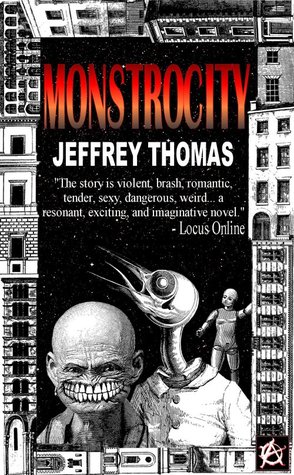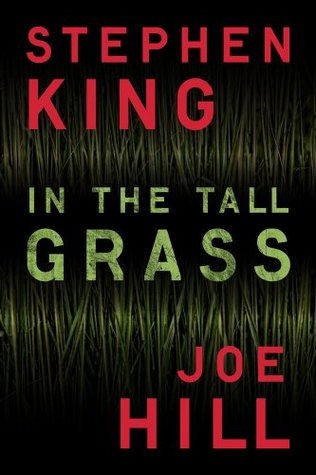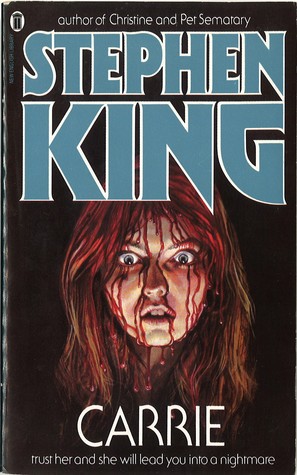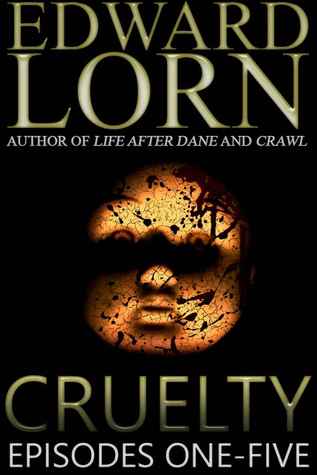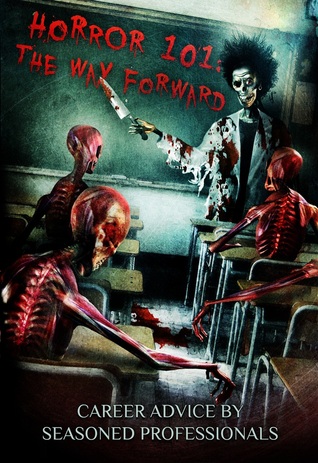This book had a lot of elements that I like: a vast, nasty SF city populated with alien and human monsters, general sleaziness and grime, an investigation into the occult, sex, violence, and gore. But I was bored to tears for the last 40% of it and couldn't wait to be finished so that I could move on to something else.
The vast conspiracy seemed pretty nebulous, and I found it hard to care about how things would turn out. I wasn't impressed with the world-building either. One of the major alien races seemed to have been constructed based on the George Lucas alien creation method wherein you must use exaggerated and bigoted cultural caricatures.
I'll give Mr. Thomas another go, but I'll likely skip his other Punktown stories.
Wednesday, October 29, 2014
Sunday, October 26, 2014
In the Tall Grass by Stephen King & Joe Hill
The product description for this book wasn't honest, and that kind of ticks me off. The way it's listed on Amazon, it looks like you're going to get a novella-length story written by Stephen King and his son Joe Hill. There is no mention of the fact that the last 25% of the eBook's length is taken up by teaser chapters from King and Hill's forthcoming novels (at the time), Doctor Sleep and NOS4A2, respectively. When the advertisements stuffed into the back amount for 25% of the page count, it just seems to me like you're paying to be pitched to. Also, not knowing from the get-go that the last 25% of the book is ad space, you get a false sense of how long the story is going to be. It really kind of fucks with the story's rhythm and flow. Yes, you can open up the Look Inside sample and see the teasers listed in the TOC for this book, but who does that when purchasing something written by Stephen King? I'd say about 1% of the potential buyers. Also, when you've downloaded (side-loaded, or whatever) the book to your Kindle and open that puppy up, you are taken to the beginning of the book to start reading. It takes a special effort to look at the table of contents. And why exactly would you look at the table of contents before you start reading what you think is a novella?
Oh, wait, what about the story, the (at most) novelette, In the Tall Grass? It was pretty good. It started out genuinely scary and got rather disturbing and disgusting as it went along. All very good for a horror story. BUT the ending was so goofy and filled with dopey, unrealistic characters, and, worst of all, it was redundant. We already knew what kind of story this was pretty early on. We didn't need a giant, tacky neon sign at the end to spell it all out for us.
Get it from your local library's digital collection or wait for a price break.
Oh, wait, what about the story, the (at most) novelette, In the Tall Grass? It was pretty good. It started out genuinely scary and got rather disturbing and disgusting as it went along. All very good for a horror story. BUT the ending was so goofy and filled with dopey, unrealistic characters, and, worst of all, it was redundant. We already knew what kind of story this was pretty early on. We didn't need a giant, tacky neon sign at the end to spell it all out for us.
Get it from your local library's digital collection or wait for a price break.
Wednesday, October 22, 2014
Carrie by Stephen King
So, why'd I read this one?
A friend of mine is re-reading all of Stephen King's novels in publication date chronological order and I told him I might join him to read the ones I've not yet read. And, no, I'd not yet read King's first published novel. For some reason, I only started reading King's earliest works within the last ten years or so, though I've been reading King for close to three decades.
So, what did I think of King's first one? I liked it. It had more meat to it than I was expecting. Is it a simple tale of bullying and revenge or is it really an expression of a culture's reactionary fear of budding female sexual empowerment and its perceived destructive impact on civilization? Structurally, it seems quite a bit different from his later stuff. The use of in-universe book excerpts and newspaper clippings was something I don't recall King using much, if at all, in later works. (I could be wrong. I'm sure someone will tell me if I am.) The writing was more stripped down, more to the point, which I liked.
This was interesting as a cultural artifact, too, a book very much of its time. Small town white America's racism is assumed. One of the main characters muses about growing up to be a clone of her mother one day and doing whatever is necessary to keep the blacks out of the country club. Two different faces, one covered in blood, the other in a mud mask, are described within thirty pages as looking like something you'd find in a minstrel show. Oh, and we also have a small town police chief slapping the shit out of people left and right because they're 'hysterical.' To me, this reads as unintentionally comical today.
Overall, I found this an engrossing read. However, I did find multiple characters recounting their versions of the same events a bit redundant at times, and the various document excerpts tacked on at the very end were pointless. But the book's true ending was much better than the ending of the DePalma film I saw so many years ago.
So the book is still better than the movie, even after the movie spoiled the book.
Books win again.
Sunday, October 19, 2014
Cruelty (Episodes 1-5) by Edward Lorn
Full Disclosure: You might think this review is biased because Edward Lorn and I are friends who help each other out with beta reading/editing/proofreading and the like. However, you must also keep in mind that I wouldn't offer to read early drafts of some creepy Internet stranger's work unless I really and truly enjoyed something else I'd read by that person. Early drafts are often pretty shitty. Lorn's aren't. But most are. And I didn't read this book as an early draft. I bought it fair and square from Amazon, and I'm under no obligation to review this book, and Edward Lorn's under no obligation to review any of my work.
Of all the works I've read thus far by Edward Lorn, this is my favorite.
I must also point out that the next installment of this serial was due out in September, and I don't have episode six of Cruelty on my Kindle yet.
My calendar must be broken.
Of all the works I've read thus far by Edward Lorn, this is my favorite.
I must also point out that the next installment of this serial was due out in September, and I don't have episode six of Cruelty on my Kindle yet.
My calendar must be broken.
Sunday, October 12, 2014
Fuckness by Andersen Prunty
Full Disclosure: I don't know the author of this book. I've never interacted with him. He didn't provide a copy of this book in exchange for an honest review. I bought this book on Amazon and will likely be paying interest on this purchase for the rest of my life. I've seen this book around, popping up here and there, for quite some time, and I never much cared for the title. I thought it was kind of gimmicky and really didn't have much interest in picking this up. Then a friend recommended it and, since I sometimes listen to people, I got an electronic copy and soon discovered that the setting for this story is likely an analog for my hometown; the geographical coordinates of the place match exactly, along with other details provided by the author. This fact alone would make any review I'd write biased, because when I was reading it I was filled with a cold and bitter nostalgia. So, I don't think it would be fair to write a review of this book. All thoughts on its contents are tainted. Read it yourself if you want to know what it's about. You might like it. You might not.
Wednesday, October 8, 2014
Blue Estate (Volume 1) by Viktor Kalvachev & Andrew Osborne
Uneven writing and uneven artwork. There is nothing new here to make this really stand out from other works of noir fiction.
Also, this four-issue collection doesn't complete a single story arc, which I found less than satisfying.
I didn't hate it. It just felt flat to me. However, if someone handed me the rest of the comics in the series, I'd read them.
Also, this four-issue collection doesn't complete a single story arc, which I found less than satisfying.
I didn't hate it. It just felt flat to me. However, if someone handed me the rest of the comics in the series, I'd read them.
Sunday, October 5, 2014
28 Far Cries by Marc Nash
The flash pieces in this book are like ZIP files that need to be unpacked.
No. That's close but not quite right.
This book is like a display case filled with 28 finely crafted, exquisitely detailed miniature sculptures. You have to pick each one up in turn, examine it on its own while lying on a hammock for a while, before returning to the case to pick up another. After reading one or two of these pieces, I decided to take my sweet time with this collection, and I'm glad I did. You could read this in an afternoon, I suppose, but I wouldn't recommend it. These flash fiction pieces have drag. (And somehow I mean drag as in the longitudinal retarding force exerted by air or other fluid surrounding a moving object.) There are little gnarly bits sticking out of these stories that you should allow to snag your attention. You should take some pleasure in examining the embedded hooks. You can tell the author has worked and reworked these pieces, grabbing different disparate bits over time and mashing them into place, working them in, rubbing and rearranging until they work.
Nash is playing with language here. That seems to be his main focus. He likes obscure and archaic words, and especially words or phrases with double or triple meanings. It was fun to see how he'd mash ideas together, reconcile juxtapositions, flog a pun to death, turn concepts inside out, and meditate on a peculiar concept until it nearly breaks under his scrutiny. In addition to inspecting the meaning of words, Nash is also obviously obsessively concerned with the sounds we make when we speak them. There is a rough rhythm to these pieces, a lot of hard consonant sounds that pop and crack and jolt and jar as you go.
This collection isn't for everyone. Many of the pieces aren't proper stories. Many are more like inspections of objects and concepts at a microscopic level. Yes, you will find stories in this thing, but there are plenty of chunks of writing therein that could just as easily be labeled anti-story. If you think you might like that sort of thing, give this a go. I had fun reading it. But, admittedly, it was less the pleasure one usually associates with reading and more the kind of fun one has while solving puzzles.
No. That's close but not quite right.
This book is like a display case filled with 28 finely crafted, exquisitely detailed miniature sculptures. You have to pick each one up in turn, examine it on its own while lying on a hammock for a while, before returning to the case to pick up another. After reading one or two of these pieces, I decided to take my sweet time with this collection, and I'm glad I did. You could read this in an afternoon, I suppose, but I wouldn't recommend it. These flash fiction pieces have drag. (And somehow I mean drag as in the longitudinal retarding force exerted by air or other fluid surrounding a moving object.) There are little gnarly bits sticking out of these stories that you should allow to snag your attention. You should take some pleasure in examining the embedded hooks. You can tell the author has worked and reworked these pieces, grabbing different disparate bits over time and mashing them into place, working them in, rubbing and rearranging until they work.
Nash is playing with language here. That seems to be his main focus. He likes obscure and archaic words, and especially words or phrases with double or triple meanings. It was fun to see how he'd mash ideas together, reconcile juxtapositions, flog a pun to death, turn concepts inside out, and meditate on a peculiar concept until it nearly breaks under his scrutiny. In addition to inspecting the meaning of words, Nash is also obviously obsessively concerned with the sounds we make when we speak them. There is a rough rhythm to these pieces, a lot of hard consonant sounds that pop and crack and jolt and jar as you go.
This collection isn't for everyone. Many of the pieces aren't proper stories. Many are more like inspections of objects and concepts at a microscopic level. Yes, you will find stories in this thing, but there are plenty of chunks of writing therein that could just as easily be labeled anti-story. If you think you might like that sort of thing, give this a go. I had fun reading it. But, admittedly, it was less the pleasure one usually associates with reading and more the kind of fun one has while solving puzzles.
Wednesday, October 1, 2014
Horror 101: The Way Forward by Joe Mynhardt (Editor)
If you can get it on a freebie day, you'll be glad someone collected and compiled these blog posts from various websites for you.
You'll find some helpful nuggets mixed in with some thinly-veiled fits of self-promotion.
The verdict? Not worthless!
You'll find some helpful nuggets mixed in with some thinly-veiled fits of self-promotion.
The verdict? Not worthless!
Subscribe to:
Comments (Atom)
